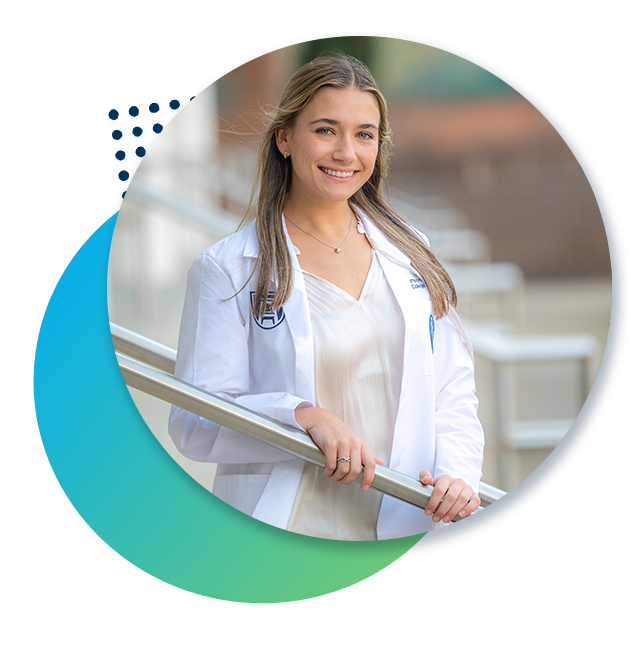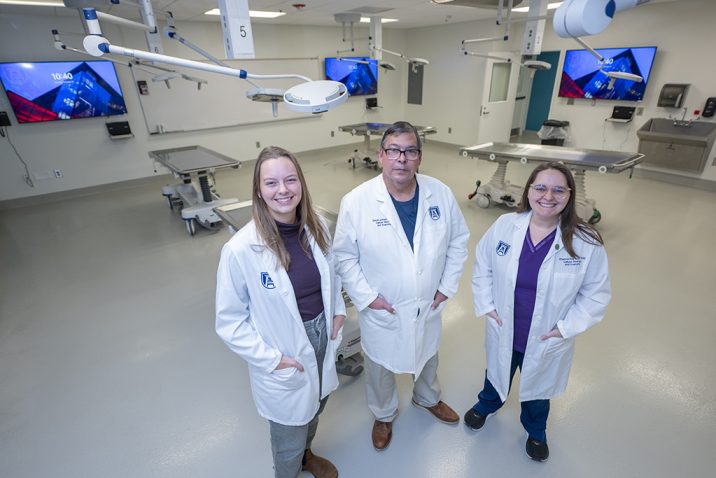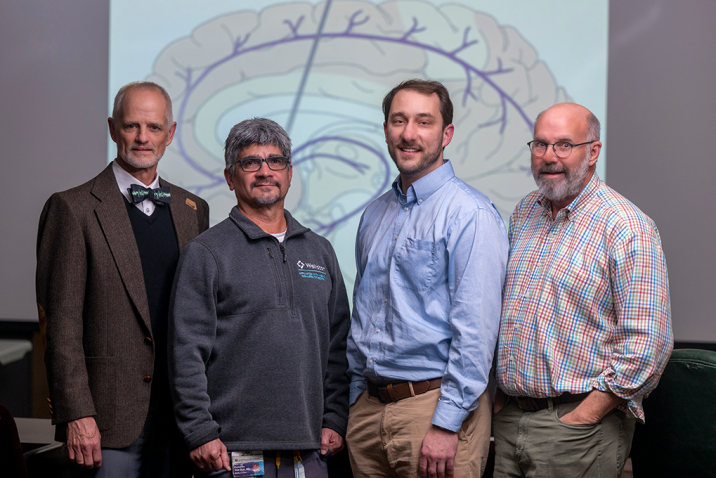Biochemistry and Cancer Biology
With a PhD in Biochemistry and Cancer Biology, you’ll be prepared to make your mark as a translational researcher.
Research in our laboratories is diverse and multidisciplinary, focusing on diagnosing, preventing, and treating various diseases. With a strong emphasis on cancer and immunology, the program inclusively investigates disorders affecting organs such as the eyes, intestines, blood, and reproductive tissues.
By choosing to earn your doctorate in Biochemistry and Cancer Biology from the Medical College of Georgia at Augusta University, you’ll be working alongside world-class researchers in state-of-the-art research facilities to advance our understanding of disease prevention, detection and treatment.
Biochemistry and Cancer Biology is for you if you consider yourself
Life-Changing
Life-Saving
Education
Want to learn more about the Biochemistry and Cancer Biology program at Augusta University?
Request InfoWhat You'll Study
Coursework
Students in Augusta University’s Doctor of Philosophy in Biochemistry and Cancer Biology program are admitted via a common admissions process to the Biomedical Sciences doctoral programs. After completing the first-year core coursework and laboratory rotations, students choose a dissertation research mentor and enter the Biochemistry and Cancer Biology program.
The average time to completion of the degree is approximately five years of full-time, year-round study.
Curriculum | Admissions Criteria | Tuition and Fees | Application Deadlines



EXPLORE. EXCEL. EXPAND.
Graduate School Advantage
Augusta University's graduate programs are among the best in the nation – and the world – and our graduate students are our most valuable assets. To ensure that our students earn more than a degree, the Graduate School offers a range of opportunities so they can develop the leadership, communication and personal skills needed for a rewarding life and academic, research or professional career.
See what the Graduate School has to offer »
About the Graduate SchoolExperience-based Education
Outside the Classroom
Access to the world-class research technology available at Augusta University, including the Georgia Cancer Center, allows students to make significant contributions to cancer prevention, treatment, and cure.
Multiple seminar series, such as the Biochemistry and Molecular Biology Series, bring internationally recognized researchers from across the university and the nation to share groundbreaking biomolecular research in a collaborative environment.
Augusta University is the primary healthcare-focused public research university in Georgia, and the program’s location on the Health Sciences Campus puts students at the heart of the university’s research enterprise.
Cancer Center
The state-of-the-art Georgia Cancer Center is home to world-class research labs and internationally-recognized cancer investigators.
Focused Education
Advanced training focuses on cutting-edge technologies and scientific communication to foster student development into independent research scientists.
Holistic Approach
Collaborative teams from diverse fields of study provide a wide range of research opportunities that maximize the chances of impactful learning and discovery.
Recognized Faculty
The program’s faculty have a passion for cancer research and education that creates an atmosphere of cooperative learning.
Your Future
Career Options
According to the U.S. Bureau of Labor Statistics, job growth for medical scientists is projected to rise much faster than the average.
The median pay for a medical scientist is $100,890 per yea, and higher in some states.
Profiles
Student Stories
I chose my degree program because the Department of Biochemistry and Molecular Biology is very collaborative. I like that I can ask for help if needed from other Professors and everyone is friendly and knowledgeable."
Karina Aguilar
My career goal is to become a PI investigating ways to reduce the harmful effects of Radiation on Astronauts in space.
Dominique Monroe
Admissions Criteria at a Glance
GPA: Overall GPA of 3.0 on a 4.0 scale at the Baccalaureate level calculated on all undergraduate work.
Degree Requirement: Minimum of a Bachelor’s degree or equivalent from an accredited college or university.
Transcripts: Official transcripts are required from all universities and colleges ever attended. Unofficial transcripts from US colleges and universities can be used in the admissions review process in lieu of official transcripts for this program.
Standardized Test Requirements: None are required for this program.
Letters of Recommendation: Recommendations from three individuals must be submitted through the application portal.
Resume: Applicants must submit a resume or curriculum vitae within the application portal.
Research Experience: Research experience is required for admission. Within the application, you will be prompted to provide both personal and research statements. Please consult the application for the full statement prompts.
International Students: Please review the verification process for international transcripts and the english proficiency requirement.
Tuition & Fees Estimate
$4,801*
Estimated total
Full-time / In-State / Per Semester
$401
Tuition Per Hour
$675
Mandatory Fees
View Detailed Program Tuition
*Tuition & Fees listed here are for in-state students enrolling in the university for Fall 2025 semester.
Detailed Program Tuition InformationApplication Deadlines
Fall '26 International Deadline**
- December 1, 2025
Fall '26 Deadline
- December 1, 2025 - extended to December 15, 2025
Early submission of all application materials is strongly advised.
All required application materials and documents must be received in order for an application to be considered complete and before an admission decision can be made. The program does not accept applications after the published application deadline, however the program will continue to accept application materials up to 2 weeks after the application deadline.

Why Augusta?
Two areas of focus allow you to concentrate on the research and career areas that inspire you.
The multidisciplinary approach to research and education provides a full-spectrum of viewpoints and experience that increase your understanding of disease and treatment.
Studying on Augusta University’s Health Sciences Campus puts you in the center of its biomedical research enterprise, with access to the Georgia Cancer Center, the Medical College of Georgia and the state’s only public academic medical center.

Families leave lasting contribution to medical science with body donations
Families leave lasting contribution to medical science with body donations
MCG starts human trials on deep brain stimulation for Alzheimer’s patients
MCG starts human trials on deep brain stimulation for Alzheimer’s patients

